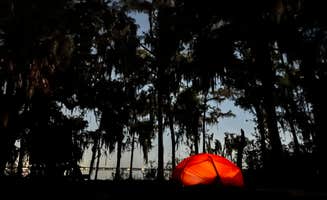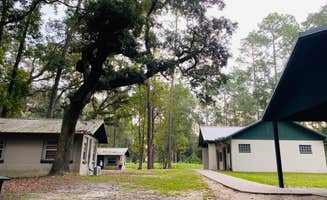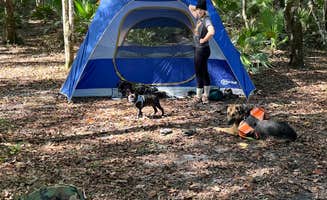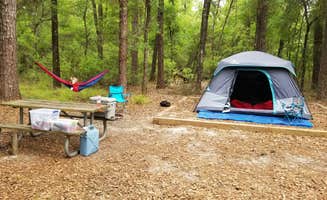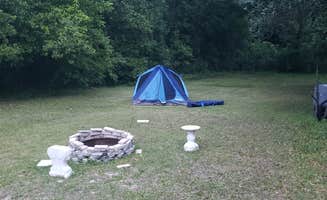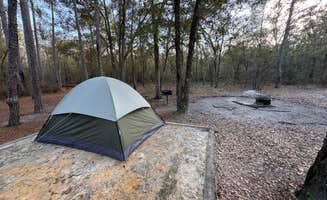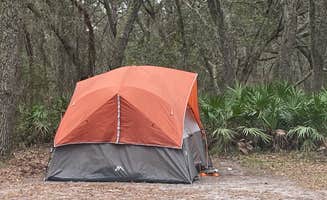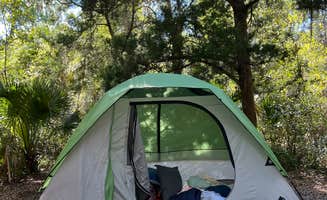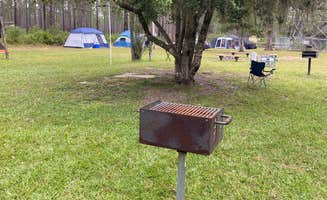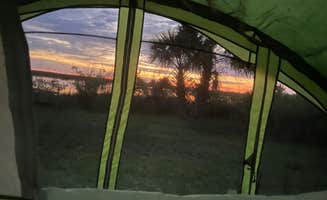Tent camping near Green Cove Springs, Florida offers a mix of riverfront and wooded sites with varying levels of accessibility. Many campgrounds in the area sit along Black Creek and its tributaries, with elevations generally below 50 feet above sea level. Summer temperatures regularly exceed 90°F with high humidity, while winter lows typically remain above freezing, allowing for year-round camping opportunities.
What to do
Kayaking from camp sites: At Camp Chowenwaw Park, campers can directly access Black Creek for water activities. "The camp has access to black creek and is fun for kayaking," notes Sean B., who appreciated the water access. The park also features "a wooden bridge over the swamp" for those who prefer hiking.
Trail exploration: Explore approximately 30 miles of trails at Jennings State Forest Hammock Campground where most paths traverse pine forests and creek areas. Wayne C. describes it as "just gorgeous for being just outside of the Jacksonville area" with "trails kept decently, mostly soft sand, or grass." The forest layout supports both day hikes and overnight trips.
Wildlife viewing: Multiple conservation areas provide opportunities to spot native Florida wildlife. At Bayard Conservation Area, campers report diverse animal sightings. "On our way to our campsite we were able to spot many animals including: deer, otter, turkey, and wild pigs," writes one reviewer, highlighting the area's ecological diversity.
What campers like
Riverside camping: Black Creek Ravine offers a walk-in tent site near the water. Nate D. describes the location: "It is about 30 feet through some trees to the river, so if you were clever, I'm sure you could find it from a boat, but for us there was zero competition for the single campsite." This secluded spot provides both privacy and water access.
Natural separation between sites: Campers appreciate the layout at many Green Cove Springs area campgrounds. At Hammock Campground, kaitlyn L. notes there is "plenty of brush between you and the next camper," creating a sense of seclusion even in established camping areas. The natural vegetation serves as effective privacy barriers.
Unique accommodations: Some campgrounds offer distinctive lodging options beyond standard tent sites. "Love this park and the tree house 'cabins'. Great place to stay with the kids," shares Chad P. about Camp Chowenwaw Park. These elevated structures provide a different camping experience while remaining affordable.
What you should know
Seasonal considerations: Summer camping requires preparation for heat and insects. "It was very enjoyable but HOT in July with no electric in the Treehouses," reports a camper at Camp Chowenwaw. For more comfortable conditions, plan trips during spring or fall months when temperatures are moderate.
Water sources: Most primitive sites require campers to bring or filter their own water. At Bayard Conservation Area, the water pump near the main facilities provides non-potable water only. Nate D. advises: "Only problem we had is it was a little tough to find nice dry firewood. Most of the log sized potential firewood was pretty green."
Access challenges: Some sites require significant hiking to reach. Nate D. shares about Bayard Conservation Area: "Hiked in about 3.3 miles, but OnX user beware, trust the trail's red marks, not the trail marked on most maps! Part of the trail was reblazed to go around a washed out section." Always check current trail conditions before starting your hike.
Tips for camping with families
Pool access: Dutton Island Preserve offers swimming opportunities for families, though with specific rules. "The only downside was the fact that they are very strict at the pool. The children had to do swim tests and wear a necklace denoting which portion of the pool they could be in," notes Jenn B. Bring identification for pool access.
Treehouses for kids: Camp Chowenwaw Park's treehouse accommodations appeal particularly to families. "We stayed here for a night and loved it. There were short trails, a kayak/canoe launch, a pool, dock, fishing, and clean amenities," shares Jenn B., who stayed in a cabin with six bunk beds that accommodated her family of six.
Pack for insects: Mosquito protection is essential, especially during warmer months. "There are lots of mosquitoes, so beware of that and bring bug spray," advises Jenn B. about Camp Chowenwaw Park. The combination of water features and tree cover creates ideal breeding conditions for biting insects.
Tips from RVers
Limited hookup options: Most campgrounds near Green Cove Springs offer primitive camping rather than full RV facilities. At Jennings State Forest, Gregory T. notes: "It's cheap. Seems like no one is around and a few of the spots are closed." While electric hookups exist at some sites, water and sewer connections are less common.
Road conditions: Access roads to campgrounds can be challenging for larger vehicles. "GPS will not get you there. Go to Middleburg. Take Long Bay Rd. Left on Old Jennings Rd. Follow signs," advises Lisa S. about navigating to Jennings State Forest. Many campgrounds feature unpaved roads that can become difficult during rainy periods.
Weather preparedness: RV campers should prepare for temperature fluctuations. "We went in March and it got pretty chilly at night, but the fire pit helped us stay warm," shares Lizzy about Jennings State Forest, highlighting the need for heating options during winter camping trips.


